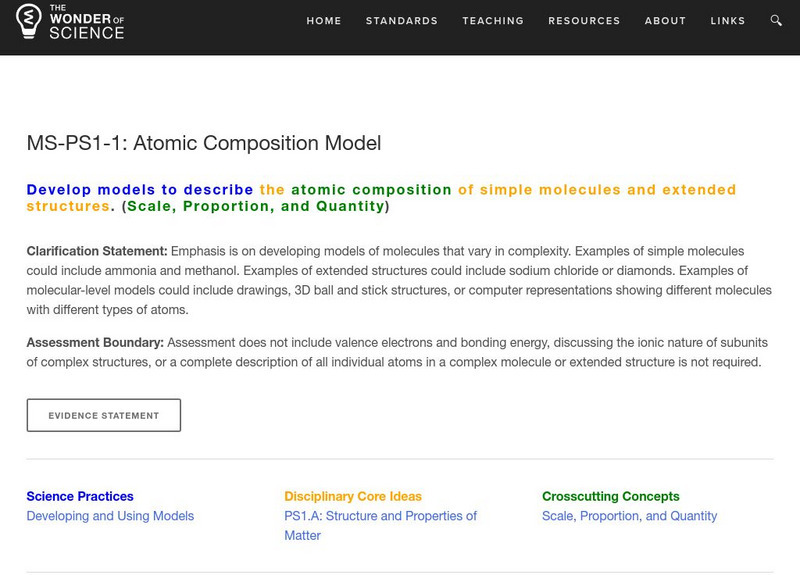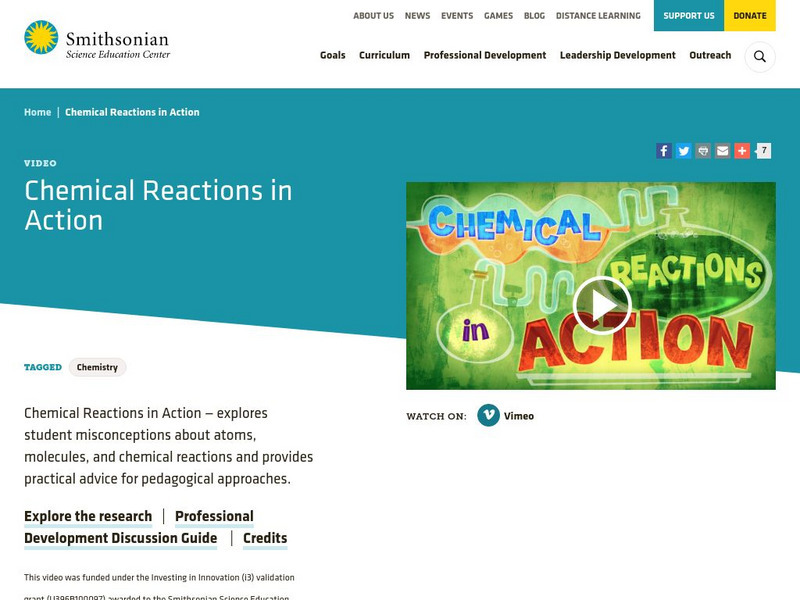Other
Science Alive: Synthetic vs. Natural: What's the Difference?
Through this reading, learners will learn that a substance's properties arise from its molecular structure, not from how it's made (i.e., synthesized by people or found in nature). There is no fundamental difference between natural and...
Other
Science Alive: What Is Organic Chemistry?
This reading/lesson plan introduces students to the concept of organic chemistry.
CK-12 Foundation
Ck 12: Life Science: 2.1 Elements and Compounds
Learn how basic elements form molecules to support life.
The Wonder of Science
The Wonder of Science: Ms Ps1 1: Atomic Composition Model
A collection of lesson plans for helping students understand atomic composition. Site uses work samples, phenomena, assessment templates, and videos to plan lessons to describe the atomic composition of simple molecules.
Smithsonian Institution
Smithsonian Science Education Center: Chemical Reactions in Action
This video is a professional development resource that explores student misconceptions about atoms, molecules, and chemical reactions. It also gives some pedagogical approaches for approaching these subjects. [10:12]
Other
Science Alive: The Many Faces of Steroids
This reading is an introduction to the great variety of steroids and their many different uses.
Curated OER
Science Kids: Science Images: Ozone Molecule
This diagram shows a 3D computer generated image of the triatomic molecule known as ozone. Ozone is an allotrope that contains three oxygen atoms. The ozone layer found in the upper atmosphere helps protect the Earth against potentially...
Khan Academy
Khan Academy: Photoelectron Spectroscopy
An explanation of how photoelectron spectroscopy can be used to detect electron structures in atoms or molecules.
Georgia Department of Education
Ga Virtual Learning: Ap Biology: Chemistry of Life
Through informational text, interactive activities, animations, and video clips, students examine the chemistry of living things, and they learn how interactions from atoms are fundamental to life as we know it.
TED Talks
Ted: Ted Ed: The Science of Macaroni Salad: What's in a Molecule?
Josh Kurz breaks macaroni salad down to its smallest chemical components. [3:14]
Other
Beautiful Chemistry: Beautiful Structures: Quasicrystals
An interactive display of quasicrystals allows students to study the inner components and molecular make-up of these structures. Since the discovery of quasicrystals, a lot of efforts have been put on finding the locations of atoms...
Georgia Department of Education
Ga Virtual Learning: Ap Chemistry: Welcome
An introduction to the College Board's AP Chemistry course, which is designed to be equivalent to a first year college chemistry course.
Concord Consortium
Concord Consortium: Stem Resources: Electric Current
In this interactive, students can explore how current, voltage, and resistance are related in a model showing the flow of electrons in an electric circuit. They will learn about Ohm's law and how other forms of energy can be made from...
Curated OER
Science Kids: Science Images: 3 D Carbon Monoxide Molecule
This is a computer generated 3D image of a carbon monoxide molecule. Carbon monoxide contains one carbon atom and one oxygen atom. It is an odorless gas that is highly toxic to humans.
American Chemical Society
American Chemical Society: Hompage
ChemCenter, available from the American Chemical Society, provides chemistry news, reference sources and other public services.
Ducksters
Ducksters: Chemistry for Kids: Chemical Bonding
Study chemical bonding in chemistry including atoms, valence electrons, ionic and covalent bonding, and how molecules are formed on this site!
Ducksters
Ducksters: Chemistry for Kids: Organic Chemistry
Kids learn about organic chemistry including the importance of carbon, organic molecules, compounds, hydrocarbons, synthesis, and functional groups.
ClassFlow
Class Flow: Comparing and Contrasting Matter
[Free Registration/Login Required] This flipchart is a guided activity to help students compare different types of matter: atoms and molecules, elements and compounds, mixtures and solutions. It corresponds to Virginia science SOL 5.4.
Curated OER
Science Kids: Science Images: Chemical Structure of Methane
This diagram shows the chemical structure of methane. A methane molecule contains one carbon atom and four hydrogen atoms.
Bill Nye
Bill Nye: Hole Y Water
Try this at-home science experiment to learn that a glass of water molecules contains a whole lot of space.
Khan Academy
Khan Academy: The Mole and Avogadro's Number
An explanation the mole (named for molecule) and Avogadro's Number. One mole of a substance is equal to 6.022 times 10 to 23rd power units of that substance (such as atoms, molecules, or ions). The number 6.022 time 10 to 23rd power is...
McREL International
Mc Rel: Glue Polymer (Whelmer #15 Learning Activity)
An easy to do activity that investigates the basic principles behind chemical bonding. The activity is written in lesson plan format that meets NSES standards.
McREL International
Mc Rel: Whelmer #33 Learning Activity: Density Balloon
A simple activity that investigates the effect of heat on the volume of a gas. The activity is presented in lesson plan format that meets NSES standards.














